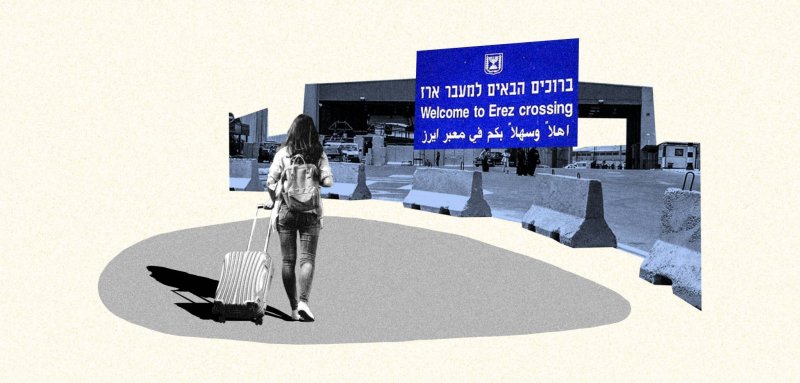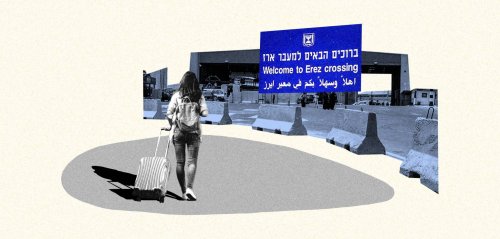Without warning, Reham wakes up to the sound of her mobile ringtone at 3 am: after 60 days, the Israeli occupation authorities have approved her permit, she should proceed to the crossing in order to obtain her permit and travel."
Reham immediately jumped off her bed, proceeding to prepare her suitcase, announcing she was travelling with not time for the usual goodbyes – there is no time for that. After a last goodbye glance at her beloved mother, leaving behind her beautiful memories, she stopped a taxi and proceeded to the Beit Hanoun border crossing – known as Erez – in the north of Gaza.
29-year old Reham Saleh is a Palestinian girl who qualified for an academic scholarship to study media production and political science in Romania, determined to fulfil her dream of getting a Masters’ degree, despite the nightmare that Palestinians experience at Israeli-controlled border crossings.
"Boots, Laptops and Cameras are forbidden"
"Israel Welcomes You" the billboard welcomed Reham at the crossing, after she had succeeded in obtaining her paperwork and travel permit from a checkpoint controlled by the Palestinian Authority. However, her passing through the "welcome" banner was hardly the pleasant experience implied; instead, it entailed the most difficult scenes she could imagine – enough to remind her of the reality of her helpless country, and serving as a warning of the obstacles that she will face. For a second, she took to her imagination and asked herself: "What if this banner was replaced with 'Palestine welcomes you' – would it not have spared us much suffering?"
She barely processed this thought when she was interrupted by the voice of an Israeli officer calling her name: it was inspection time. With his index finger, he pointed at her bag, which appeared to hold a list of what he considered to be problematic and forbidden items, despite Reham only carrying her basic necessities and some shoes – winter in Romania was bitterly cold – in addition to a camera and a laptop. The officer started throwing her belongings outside her bag, and forbade her from taking her laptop and camera– the most important items that she needed for her work and studies; not yet satisfied, he proceeded to tell Reham in Hebrew: "Your suitcase cannot cross to Israel… it has wheels."
According to Reham, "this moment was sufficient to return me to stage zero" – she was overcome with despair and broke down in tears: for what else could she do – there was no time left, and the bus had filled with passengers.
Palestinians Destiny
It seems that being an estranged foreigner is the destiny for Palestinians wherever they may be – a reality that Reham stressed as she told her story to Raseef22. "After the Israeli officer refused to let my suitcase pass with me, I threw it outside, and carried my belongings in a small makeshift bundle. I remember then what had happened to my grandparents in the 1948 Nakba, and began spontaneously crying, until one of my fellow travelers came to calm me down, telling me that I had the option of buying a plastic bag which was sold specifically for those who experienced my problem – while another fellow traveler – a foreigner – agreed to carry my laptop and camera with him, until we exited the inspection checkpoints."
Mission Impossible
For Reham, the notion of leaving Gaza was almost an impossible mission; she received a travel permit after she was refused four times by the Israeli occupation, under vacuous excuses of "security reasons". Reham says: “I was in a race with time as the start of the term was approaching, all my colleagues had already begun their studies while I remained behind; I couldn't travel through the southern Rafah border crossing as my number was in the thousands – that is, my turn to cross the Rafah crossing would arrive in perhaps more than a year; furthermore, I didn't have enough money to pay for the exit taxes– so I decided to gamble by travelling through Erez crossing, despite my foreknowledge of the obstacles I would face, but I refused to surrender. The occupation authorities forced me to sign a pledge that I would not return to Gaza except after six months, in exchange for allowing me to travel to study."
After four rejections, Reham finally got clearance to leave Gaza via the Erez Crossing to fly from Tel Aviv to Bucharest, where she got a college scholarship. Her dehumanization at the Erez crossing bears witness to Israel’s policy towards Palestinians.
Israeli authorities added new items to the list of prohibited goods for those with travel permits: suitcases with wheels, cleaning materials, computers, electronic devices, phone chargers, food, beauty products, and certain types of shoes.
Reham experienced two contradictory feelings during her journey; her first, abject misery at the border crossing, and the second, her trivializing of the mentality of the Israeli occupation, which prohibited her from taking her favorite boots – what danger did those boots pose to Israel's security?
The population in Gaza lives in total isolation, separated from the outside world by two border crossings: the first, Rafah in the southern Gaza strip, under the authority of Egypt, and the second Beit Hanoun/Erez in the north of the strip, under the control of the Israel Occupation.
In the 1990s, the Israeli occupation stipulated that Gazans travelling through Erez had to first receive travel permits that are issued according to its own policies; following the takeover of the strip by Hamas in June 2007, the Occupation tightened the restrictions on Gazans, conditioning that permits be subject to 'security inspections' before being issued.
The Threat From A Cancer Patient
Reham's experience differed little from that of Ra'fat Sha'abani, a Palestinian man in his fifties, who has been waiting for two months for a "medical permit" to allow him to travel for treatment abroad – namely, in a hospital in Occupied Jerusalem. Having colon cancer would not suffice for the Israeli authorities to grant him a permit however – being rejected for three consecutive times by Israeli Occupation. After each time, Sha'abani would head to the Civilian Affairs department in Gaza to enquire about the reasons for his refusal, only to be told that his entry was refused according to previous statements by the Israeli authorities alleging "security reasons."
Ra'fat needs to undertake chemotherapy once every 15 days, but 60 days have passed without treatment, which greatly endangers both his physical and mental health – a direct result of the stalling tactics of the Israeli authorities and their forbidding him from passing through Erez crossing.
Sha'abani described his tragic condition by stating: "What cancer patients live through in Gaza is against all of the Abrahamic religions, laws and human rights" – adding to Raseef22: "It is not enough that we already undergo tortures and miseries at Erez, entailing the harshness of the inspection procedures at the hands of the Israeli officers, extortion, forbidding us from taking food and certain medicines – notably ointments – as well as mobile phone batteries; we are prohibited from treatment because of vacuous reasons that are not meant for anything other than to exercise pressure on us."
Sha'abani is accompanied by his wife in his treatment journey as she is also over fifty years of age – otherwise, those below fifty would not be allowed to accompany patients.
Isolating Gaza
The Israeli authorities also impose additional constraints on those with permits (students, the sick, merchants, humanitarian cases, employees of international organizations, visa holders) which have entailed preventing and delaying the issuing of travel permits and stalling in the process of security checks, which can take six to nine months, while tightening restrictions on those working in international humanitarian and relief organizations – restrictions which have impeded their work in Gaza.
During the past few years, the Israeli authorities have added new items to the list of prohibited goods for those with travel permits: suitcases with wheels, cleaning equipment, computers, electronic devices, mobile phone chargers, food, makeup and beauty products, and certain types of shoes.
According to a Palestinian merchant who uses the crossing who preferred not to reveal his name, his reality is not much better, for the Israeli authorities intentionally delay the issuing of his travel permit as a form of stalling and procrastination. In order to circumvent the obstacles he finds at inspections at the Erez crossing, the merchant travels "without any bags", only taking his official papers and the permit.
The merchant explained to Raseef22 the process by which he travels through the crossing, saying: "At the start of my entry into the hall of the crossing, my leather belt, shoes, ring, mobile phone and any other items are placed inside boxes for inspection, and then I am presented in front of a device which emits blue rays, revealing every detail of my body up to [including even] my spine; I walk barefooted to take my box after the end of the inspection that could take a few hours, according to the mood of the Israeli officer, and then my paperwork and permit is examined behind a glass window."
The merchant further added that he usually needs to wear an official suit when meeting with the owners of commercial companies inside 1948 Occupied Palestine thus having to buy from their markets – even though its price is much more expensive than in Gaza.
Meanwhile, Mervat al-Nahaal – a lawyer and human rights activist who works as the coordinator of the legal aid unit at Gaza's "Al Mezan Center for Human Rights" – affirmed that the Israeli Occupation's policies of restricting the freedom of travel of Palestinians through the Erez crossing is a direct violation of their freedom of movement – a principle which is safeguarded by all international laws and conventions.
Al-Nahaal further pointed out that the Occupation authorities refuse to issue permits to certain sick Palestinians using the excuse that they are family relations of Hamas members – a criteria which is rejected in legal terms, as it constitutes a form of collective punishment that goes beyond targeting a single individual. Furthermore, there are cases of wounded from the Great March of Return who are prevented from receiving treatment as a form of punishment for their participation in the demonstrations, without any reference to international humanitarian law – adding that there are additional restraints on merchants, students, and humanitarian cases.
On the negative ramifications of these form of violations committed towards Palestinians, al-Nahaal affirmed that it has negative effects and deprives from them the most important rights: the freedom to travel, the right to education and reunification with family –harming family bonds, isolating Palestinians from the world, and the deterioration of economic, social and health conditions.
Raseef22 is a not for profit entity. Our focus is on quality journalism. Every contribution to the NasRaseef membership goes directly towards journalism production. We stand independent, not accepting corporate sponsorships, sponsored content or political funding.
Support our mission to keep Raseef22 available to all readers by clicking here!
Interested in writing with us? Check our pitch process here!






